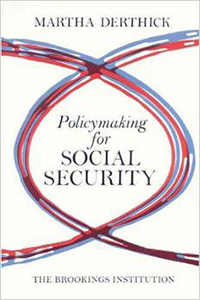Derthick, Martha. Policymaking for Social Security. Washington, D.C.: Brookings Institution Press, 1979.
“Probably [Derthick’s] best known study was Policymaking for Social Security (1979), which won the Gladys Kammerer award of the American Political Science Association. The book analyzed how Social Security grew from a small program at its birth into a political fortress with almost no visible conflict. Against the view that Social Security’s success was inevitable and straightforward, Derthick located the answer in the agenda-setting power of program executives, who had a strong sense of proprietorship in the program; the autonomy of Social Security from regular mechanisms of democratic accountability and control, including partisan debates and the annual appropriations process; and the self-interest of voters, who got back far more in benefits than they paid in taxes. The book was based on a detailed analysis of congressional debates and executive decisions, and eschewed the arcane language and highly technical statistical models common in modern political science. Her muscular writing style reflected the influence of her father, a reporter and editor for the Cleveland Plain Dealer. ‘By family background and childhood experience, I have always been more journalist than social scientist, and what I did in the book was try to construct the reality of policymaking,’ Derthick reflected in a 2004 symposium on the book’s contributions.”
-Eric Patashnik
Online:
Amazon
Brookings Institution Press

